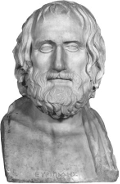Euripides: Master of Greek Tragedy
One of the three great tragedians from Ancient Greece was Euripides. He succeeded Aeschylus and Sophocles as the pre-eminent tragic playwright. 
Euripides was born about 480 B.C. on the island of Salamis. An oracle told his parents, Mnesarchus and Cleito, that the boy would win "crowns of victory," and so they set about having him train for a career as an athlete. Euripides had other ideas and studied painting and philosophy; ultimately, he found that he had considerable skill as a playwright. He is as well known as Aeschylus and Sophocles, but he did not have as much success in the famous drama competitions as they did. He competed at City Dionysia first in 455 B.C. Fourteen years later, he won for the first time. Euripides is thought to have written about 90 plays; few have survived. The most well-known of these are the following:
The most famous of these is probably Medea, the story of the wife of the famed Argos captain Jason and of the fate of their children. Many drama critics consider Medea to be one of the most powerfully drawn female characters in ancient drama. Euripides wrote mainly tragedies, but he did also write romantic dramas, among them Helen (of Troy) and Iphigenia in Tauris. One main difference in style between Euripides and his predecessors was that the fate of the main characters in a Euripides play largely were of their own making, not as a result of random chance or of a god's whims. Many of his characters offer larger glimpses into their psyches and motivations than do those written by Aeschylus and Sophocles. He last competed at City Dionysia in 408 B.C. and died two years later (not in Athens but in Macedonia). He won first prize five times, with one of those a posthumous award.
|
|
Social Studies for Kids
copyright 2002–2026
David White




